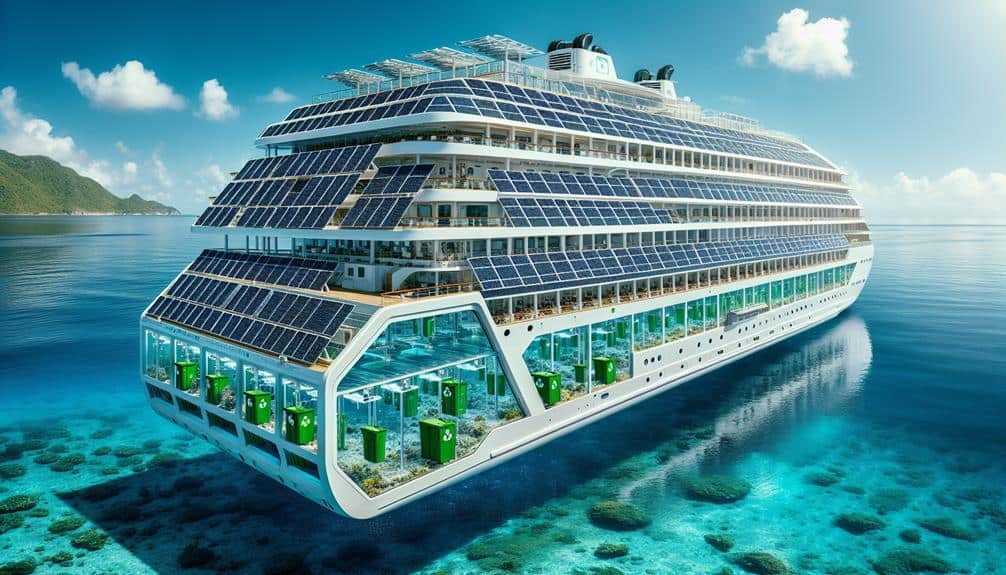Cruise ships utilize eco-friendly practices, such as energy-efficient lighting with solar panels and LEDs, reducing energy consumption and heat output. They manage waste through composting and recycling, diverting waste from landfills and promoting sustainability. Water conservation is prioritized with greywater treatment and reuse systems, decreasing reliance on shore-based sources. Eco-friendly cleaning products minimize water pollution and marine life impact. Sustainable food practices include local sourcing, seasonal menus, and collaboration with suppliers for environmental conservation. These practices collectively contribute to a greener maritime industry.
Key Points
- Integration of solar panels and LED technology for energy efficiency.
- Implementation of waste management and recycling programs onboard.
- Adoption of water conservation initiatives like greywater treatment.
- Use of eco-friendly cleaning products and practices to reduce pollution.
- Embrace of sustainable food sourcing and preparation practices for environmental conservation.
Energy-Efficient Lighting Systems
Energy-efficient lighting systems are essential for reducing energy consumption on cruise ships. Integrating solar panels along with LED technology plays a pivotal role in achieving sustainability goals.
Solar panels harness sunlight and convert it into electricity, providing a renewable energy source that greatly reduces the ship's reliance on traditional power grids. LED technology offers high efficiency, durability, and longer lifespans compared to traditional lighting options.
The use of LEDs results in lower energy consumption and decreased heat output, contributing to a more eco-friendly lighting solution onboard.
Waste Management and Recycling Programs
Implementing thorough waste management and recycling programs onboard cruise ships is essential for minimizing environmental impact and promoting sustainable practices. Cruise ships have introduced various initiatives to manage waste efficiently and recycle materials to reduce their ecological footprint. Here are some key strategies in place:
- Composting Programs: Many cruise lines have implemented composting programs to reduce organic waste. Food scraps and other biodegradable materials are collected separately and processed into compost, which can then be used to enrich the ship's landscaping or donated at ports of call.
- Waste Reduction Measures: Cruise ships are increasingly focused on waste reduction, encouraging passengers and crew to minimize single-use plastics, recycle paper and cardboard, and properly dispose of hazardous materials. Some ships have also adopted advanced waste sorting systems to streamline the recycling process.
- Recycling Innovations: Utilizing green technology, cruise ships have invested in onboard recycling facilities to efficiently manage materials like glass, aluminum, and plastic. These innovations help make sure that recyclable waste is processed correctly and diverted from landfills, contributing to a more sustainable operation.
Water Conservation Initiatives
Cruise ships are increasingly adopting water conservation initiatives as part of their commitment to sustainable practices and reducing environmental impact. Greywater treatment systems are being implemented to treat wastewater from sinks, showers, and laundry facilities. This treated greywater can then be reused for non-potable purposes like cleaning and irrigation, reducing the overall water consumption onboard.
Furthermore, onboard desalination processes are being utilized to convert seawater into fresh, drinkable water. This helps reduce the reliance on shore-based freshwater sources and minimizes the environmental impact of transporting water to the ship. By producing water onboard through desalination, cruise ships can better manage their water resources while operating in remote locations or areas where freshwater availability is limited.
Eco-Friendly Cleaning Products and Practices
Utilizing environmentally-friendly cleaning solutions and methods is a pivotal aspect of maintaining sustainable practices aboard cruise ships. When it comes to green cleaning on cruise ships, eco-friendly detergents and practices play a significant role in reducing the environmental impact of cleaning operations. Here are three key points to take into account:
- Biodegradable Cleaning Products: Cruise ships often use biodegradable cleaning products that break down naturally without harming the marine environment. These products are designed to minimize water pollution and protect marine life.
- Efficient Cleaning Methods: Implementing efficient cleaning methods such as microfiber cloths and steam cleaning not only reduces the use of harmful chemicals but also conserves water onboard. This contributes to a more sustainable approach to cleaning practices.
- Waste Reduction Strategies: Cruise lines focus on waste reduction by using concentrated cleaning solutions to minimize packaging waste and reduce the overall carbon footprint of cleaning activities. By opting for eco-friendly detergents and practices, cruise ships can uphold their commitment to environmental stewardship while providing a safe and clean onboard environment.
Sustainable Food Sourcing and Preparation
To guarantee the sustainability of onboard operations, cruise ships prioritize sourcing and preparing food in environmentally responsible ways that minimize ecological impact. Local sourcing plays an essential role in reducing the carbon footprint of cruise ship food operations. By procuring ingredients from nearby suppliers, ships can lower transportation emissions and support local economies.
Additionally, cruise lines embrace seasonal menus to align with nature's natural production cycles. This approach not only assures fresher and more flavorful dishes but also reduces the energy required for out-of-season produce cultivation and transportation.
Implementing sustainable food practices involves meticulous planning and collaboration with suppliers to maintain a steady flow of locally sourced, seasonal ingredients. Cruise ships must also adhere to strict guidelines to guarantee the authenticity of their claims regarding food sustainability. By embracing local sourcing and seasonal menus, cruise ships can substantially contribute to environmental conservation efforts while offering guests a diverse and environmentally conscious culinary experience.
Frequently Asked Questions
How Do Cruise Ships Dispose of Hazardous Waste Such as Chemicals and Batteries?
When disposing of hazardous waste like chemicals and batteries, cruise ships adhere to strict protocols. Chemical recycling methods are employed to minimize environmental impact. Batteries are safely collected and sent for proper disposal at designated facilities.
What Measures Are in Place to Reduce Air Pollution From Cruise Ship Emissions?
To reduce air pollution from cruise ship emissions, they implement emission reduction strategies like using alternative fuels. By adopting cleaner technologies and fuel sources, cruise ships actively work towards minimizing their environmental impact and improving air quality.
Do Cruise Ships Have Policies in Place to Protect Marine Life and Ecosystems During Their Voyages?
Cruise ships implement marine conservation policies to safeguard ecosystems and wildlife. Sustainable practices promote eco-tourism, minimizing impacts on vulnerable marine life. Policies prioritize wildlife protection, fostering responsible interactions and preserving marine ecosystems for generations to come.
How Are Cruise Ships Working to Minimize Their Impact on Local Communities and Cultural Heritage Sites?
Embracing the phrase "actions speak louder than words," cruise ships engage locally by supporting communities through economic investments and educational programs. They preserve cultural heritage sites by implementing strict visitation guidelines and restoration projects.
Are There Any Initiatives in Place to Promote Sustainable Tourism Practices Among Passengers on Cruise Ships?
Passenger education plays a key role in promoting sustainable tourism practices on cruise ships. By incorporating green technology and prioritizing energy efficiency, passengers can actively contribute to reducing the environmental impact of their travels.




